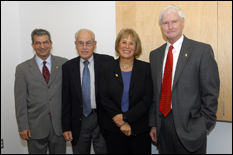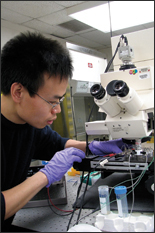News Story
$1 Million For Nano-Bio Initiative

(L-R) Dean Farvardin, Robert W. Deutsch, Jane Brown (of the Deutsch Foundation) and Provost Destler. (Photo by Al Santos)
"We are very excited and pleased to support this pioneering research, which represents the enormous potential in the merging of biology and nanotechnology."
Robert W. Deutsch
A cross-disciplinary group of researchers associated with the Clark School is developing a new "biochip" technology that promises to give doctors a new way to discover drugs to treat bacterial infections—without stimulating resistance-building mutations.
The Deutsch Foundation, based in Baltimore, is funding the work in the hope of speeding development of new life-saving drugs and advancing the new field of nano-biotechnology.
"We are very excited and pleased to support this pioneering research, which represents the enormous potential in the merging of biology and nanotechnology," says Robert W. Deutsch, foundation president. "We believe that practical applications of this research could become the source of future innovations."
Deutsch will participate in an agreement-signing ceremony at the Clark School's Kim Engineering Building later today.
Controlling Biology at the Nanoscale: Next Generation BioChips for Drug Discovery
Anthrax, tuberculosis, meningitis and pneumonia are all caused by bacteria and treated through the use of antibiotics. But bacteria can mutate, and develop resistance to the antibiotics—even to vancomycin, the most potent antibiotic currently available to doctors.
University of Maryland researchers—from the Clark School and the University of Maryland Biotechnology Institute in College Park and the School of Pharmacy in Baltimore—are developing a nanoscale, microfluidic biochip that can serve as a tiny drug discovery laboratory. The chip can, in effect, serve as a miniature test subject—accepting a drug and reporting back on how it performs.
The Deutsch Foundation is funding a specific biochip research program designed to complete the group's work and demonstrate its usefulness. The program will investigate biochips that address quorum-sensing bacteria, or bacteria that gather in an area of the body and signal each other until there are enough bacteria gathered to mount an attack. If a drug is found that can block the bacteria from signaling each other, the attack can be prevented.
The biochip can be used as a testbed for such drugs—drugs that the bacteria won't be able to develop a resistance to, unlike antibiotics. Success for this application could have widespread implications for testing drugs for a wide range of health problems.
The Clark School's William Bentley (bioengineering), Reza Ghodssi (electrical and computer engineering [ECE], Institute for Systems Research[ISR] and Maryland NanoCenter) and Gary Rubloff (Maryland NanoCenter, materials science and engineering, ECE and ISR) are involved in this research.
Clark School press release.
Published August 31, 2006











